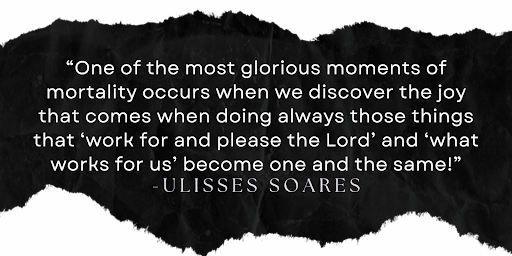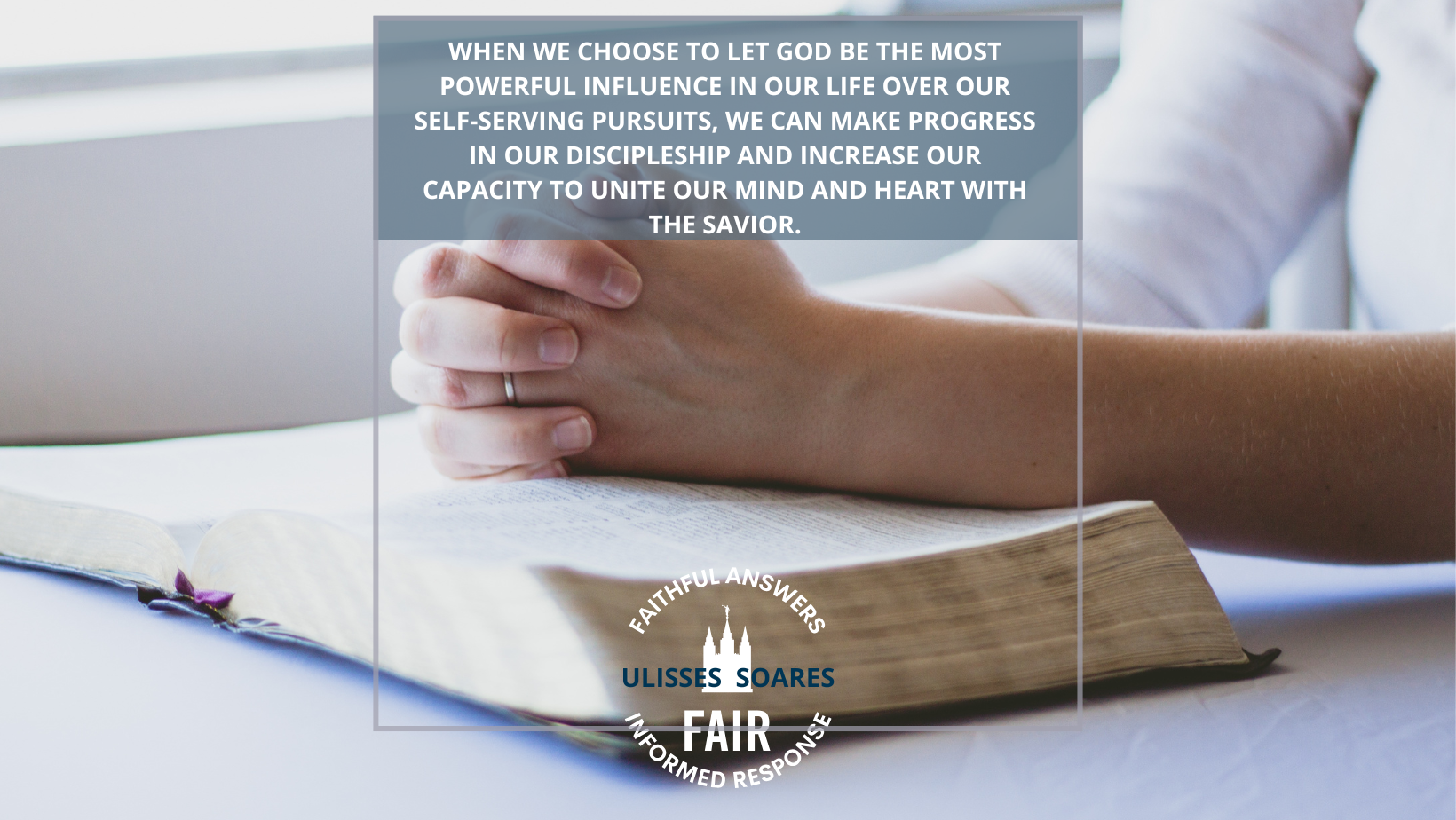
What does it mean to align our will with God’s? Elder Ulisses Soares’s recent General Conference address, “Aligning Our Will with His,” offers profound insights into the nature of discipleship, obedience, and the eternal rewards of yielding to God’s will. For many members of the Church of Jesus Christ of Latter-day Saints—and those curious about the faith—questions surrounding submission to God, eternal life, and following His plan surface frequently. Elder Soares’s teachings provide a rich perspective, particularly for those experiencing faith-related concerns or questioning the principles of obedience, agency, and the balance between personal and divine will.
Common Questions, Misconceptions, and Criticisms
Doctrine
- Doesn’t obedience to God require me to suppress my true self, making it impossible to be authentic?
- Response: This misconception rests on the assumption that authenticity—as defined by modern cultural norms—necessarily conflicts with discipleship and obedience to God. Elder Soares challenges this worldview by redefining authenticity through a redemptive lens. He teaches that true authenticity comes from aligning our desires with God’s will, allowing us to experience transformation and joy. Elder Soares states: “When we choose to let God be the most powerful influence in our life over our self-serving pursuits, we can make progress in our discipleship and increase our capacity to unite our mind and heart with the Savior.” True authenticity is not about uncritically embracing every desire or impulse we feel. Instead, it involves becoming more Christlike—embracing who we are as children of God while striving to become our best selves through His grace. This process of transformation doesn’t diminish individuality; it magnifies it, helping us become more aligned with our divine potential.
- Jeffrey Thayne, in his FAIR 2024 European Conference talk, “The Gospel Lens” adds depth to this concept. He distinguishes between the expressive gospel—which prioritizes self-expression at all costs—and the redemptive gospel, which treasures reconciliation with God and transformation through Christ. When seen through the redemptive lens, authenticity means being “genuinely good,” not making a pretense of righteousness but sincerely striving to embody Christlike virtues.
- Fallacy Check: This misconception often arises from a false dichotomy, which presents two mutually exclusive options—being authentic or being obedient—while ignoring a third possibility: that true authenticity is found in becoming our best selves through Christ.
- It may also involve a confirmation bias, where individuals interpret Church teachings or experiences selectively to reinforce the belief that obedience suppresses individuality. For example, they might focus on commandments as restrictive without considering how living them can bring freedom from harmful habits or personal growth.
- Resources: Jeffrey Thayne’s talk: “The Gospel Lens“
- Does obedience to God mean giving up my agency, since it requires me to follow rules and commandments?
- Response: This misconception assumes that obedience and agency cannot coexist, framing them as opposites. However, Elder Soares teaches that obedience is not the surrender of agency but the ultimate exercise of it. Obedience involves willingly choosing to align our will with God’s—a choice that demonstrates trust in His eternal perspective and love for us. Christ Himself exemplified perfect obedience, even in the most difficult circumstances, when He declared, “Not my will, but thine, be done” (Luke 22:42). This act of submission was not a relinquishment of agency but a conscious, faith-filled decision to fulfill His divine purpose. Similarly, when we obey God, we use our agency to choose a path that leads to greater freedom, joy, and eternal growth.
- Agency is not the freedom to do whatever we want without consequence—it is the power to choose between paths and their associated outcomes. Elder Soares emphasizes that when we align our will with God’s, we are not losing our agency but exercising it in its highest form: choosing what will bring us closer to Him.
- Fallacy Check: This misconception often stems from a false dichotomy, which frames obedience and agency as mutually exclusive when, in reality, they complement each other. It also reflects a misunderstanding of agency, equating it with unrestricted freedom rather than the ability to choose between good and evil and accept the natural consequences of those choices.
- Another bias at play may be reactance bias, where people perceive any restriction or commandment as a threat to freedom and instinctively resist it, even if the restriction is for their benefit. For instance, commandments like keeping the Sabbath holy or living the Word of Wisdom might feel restrictive until one experiences the blessings of peace, health, and spiritual renewal that come from obedience.

Defending Divine Doctrine
Doctrinal Emphasis:
Elder Soares draws from Christ’s example of perfect submission to the Father, echoing scriptures such as John 5:30: “I seek not mine own will, but the will of the Father.” This teaching serves as a profound apologetic for understanding obedience as a path to peace rather than restriction.
Application: Following Christ’s example means trusting the Father’s plan even when the path is unclear. This might involve accepting unexpected trials or promptings that require significant faith. For instance, someone contemplating a mission or other major life change can draw strength from Christ’s words in John 5:30, trusting that yielding to God’s will leads to peace and purpose.
In moments of doubt or when discussing these topics with others, we can rely on the Savior’s example of perfect obedience and sacrifice. By choosing God’s will over our own desires, we exercise faith that His path will lead us to greater joy and understanding, as promised in Ether 6-11 in “Come, Follow Me.”
- Question: How can God’s love be unconditional if His blessings are conditional?
- Response: This question highlights a common misunderstanding about the nature of God’s love and His blessings. In LDS doctrine, God’s love is entirely unconditional—He loves all His children perfectly and completely, regardless of their choices or circumstances. However, His blessings are conditional because they are tied to obedience and covenant-keeping, which reflect our willingness to receive and align with His will. Elder Dallin H. Oaks taught, “God’s love is so perfect that He lovingly requires us to obey His commandments because He knows that only through obedience to His laws can we become perfect, as He is. For this reason, God’s anger and His wrath are not a contradiction of His love but an evidence of His love. Every parent knows that you can love a child totally and completely while still being creatively angry and disappointed at that child’s self-defeating behavior.” (Love and Law, October 2009). In this way, conditional blessings do not limit God’s love but demonstrate it. They encourage our growth and development by inviting us to make choices that lead to happiness and eternal life. Aligning our will with God’s allows us to access these blessings. Obedience is not about earning God’s love—it’s about qualifying for the blessings He has promised to those who follow His commandments, much like a loving parent sets boundaries for their children to help them thrive.
- Fallacy Check: This topic often involves the equivocation fallacy, where terms like “love” and “blessings” are conflated. God’s love and His blessings are distinct: love is freely given, while blessings depend on our choices and actions.
- It may also involve black-and-white thinking, which assumes that if God’s blessings are conditional, His love must also be conditional. This oversimplification overlooks the complexity of divine relationships, where love and justice coexist.
- Lastly, emotional reasoning may play a role, where feelings of unworthiness or doubt about receiving blessings are interpreted as evidence that God’s love is conditional. This can lead to unnecessary spiritual distress and misinterpretation of doctrinal truths.
- Resources:
- Elder Jeffrey R. Holland’s talk: “The Laborers in the Vineyard“
- Elder Dallin H. Oaks’s talk: “Love and Law“
Historical and Doctrinal Connections
Contextual Background on Agency and Obedience
Understanding obedience as a principle of discipleship sheds light on LDS doctrines about the nature of God, agency, and the importance of eternal covenants. Throughout scripture, from the Book of Mormon to the New Testament, followers are invited to “come unto Christ” by prioritizing divine will over personal inclination. As Elder Soares notes, when the Savior says, “not my will, but thine, be done” (Luke 22:42), He demonstrates the pathway for discipleship—a willingness to yield to divine guidance, with promises of peace and eternal purpose.

Living Apologetics
Practical Application
In our daily lives, aligning our will with God’s may seem challenging amid modern philosophies that emphasize self-direction. For those desiring practical approaches to faithful discipleship, Elder Soares suggests:
- Daily Surrender through Prayer: Begin and end each day with a prayer of submission, asking God to guide your decisions and actions. Elder Soares highlights the importance of aligning our will with God’s, and a daily prayer of surrender allows us to invite His guidance into even the smallest aspects of our lives.
- Reevaluate Priorities Regularly: Set aside time each week to reflect on how your choices align with God’s will. Elder Soares reminds us that self-centered pursuits can create stumbling blocks to spiritual progress.
- Act with Covenant Confidence: Approach challenges with the assurance that obedience to God’s will brings divine support and blessings. Elder Soares encourages us to act with faith, trusting that God’s plan leads to eternal joy.
Faith in Action
Encouraging actions that align with Elder Soares’s teachings could include:
- Weekly Reflection: Each week, study and ponder a specific aspect of aligning with God’s will, using scripture and prayer.
- Goal-Setting: Identify personal goals that align with the divine pattern Elder Soares describes—such as setting time for prayer, scripture study, and meditation on one’s willingness to follow God’s promptings.
- Engagement with Others: Offer insights from the talk in Sunday discussions or family gatherings, helping others see how Elder Soares’s message can be applied in real-life contexts.
Quick Reference: Key Defenses and Facts
Defensive Highlights
- Agency and Obedience: Agency is foundational; God respects our choice even as He invites us to follow His will for greater joy.
- Purpose of Obedience: Aligning with God’s will is a principle of discipleship that brings peace and direction, as seen in Ether 6-11.
Top Apologetic Facts
- Scriptural Example: The Savior’s life serves as the ultimate example of alignment with God’s will (John 5:30).
- Philosophical Counterpoints: The modern idea of “my truth” contrasts with the scriptural principle of divine truth guiding individual lives.
Conclusion
Encouragement and Reflection: Elder Soares’s message offers a comforting yet profound challenge: to make God’s will our own. By adopting His teachings, we can find answers to some of life’s most difficult questions and feel the peace and security that come from obedience. Elder Soares reminds us that “[doing] what works for and pleases the Lord” leads to the ultimate reward, the kingdom of heaven. How might aligning with God’s will transform your journey?

“One of the most glorious moments of mortality occurs when we discover the joy that comes when doing always those things that “work for and please the Lord” and “what works for us” become one and the same! To decisively and unquestioningly make the Lord’s will our own requires majestic and heroic discipleship! At that sublime moment, we become consecrated to the Lord, and we totally yield our wills to Him. Such spiritual submissiveness, so to speak, is beautiful, powerful, and transformational.”
Share your insight
Your thoughts and experiences can help others along their journey. Share them below, and let’s continue this conversation on remaining spiritually grounded.
The Consider Conference series by FAIR offers an in-depth look at recent General Conference talks to help members of the Church of Jesus Christ of Latter-day Saints navigate common questions, misunderstandings, and criticisms. Each post provides doctrinal insights, historical context, and practical ways to apply gospel principles in everyday conversations. Through this series, we hope to equip readers with faith-promoting resources that encourage thoughtful reflection, respectful dialogue, and a stronger foundation in gospel truths, fostering both personal conviction and meaningful discussions with others.
